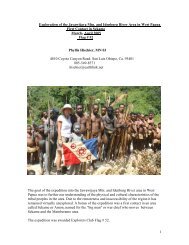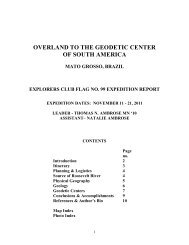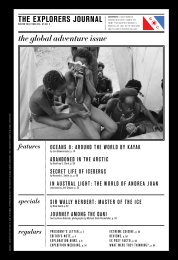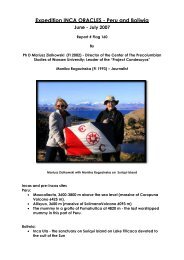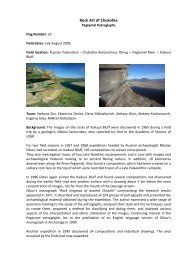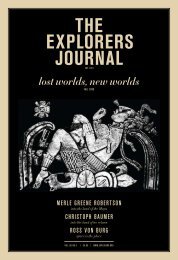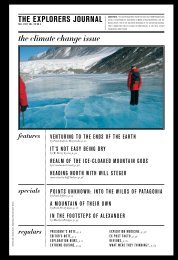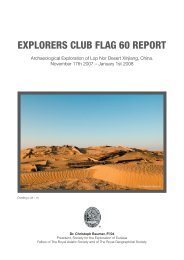the explorers journal - The Explorers Club
the explorers journal - The Explorers Club
the explorers journal - The Explorers Club
You also want an ePaper? Increase the reach of your titles
YUMPU automatically turns print PDFs into web optimized ePapers that Google loves.
<strong>the</strong> <strong>explorers</strong> <strong>journal</strong><br />
spring 2010<br />
president’s letter<br />
a new golden age<br />
<strong>The</strong> <strong>the</strong>me of ECAD 2010, “On <strong>the</strong> Cusp of Infinity: Exploring<br />
<strong>the</strong> Universes Out <strong>The</strong>re,” focuses on a very important topic<br />
to us all, which is especially relevant to those involved in <strong>the</strong><br />
discovery realm. Today, discovery is on <strong>the</strong> brink of a whole new<br />
“golden age” of exploration relating to <strong>the</strong> rapidly expanding<br />
boundaries of our universe. As space exploration continues to<br />
develop—along with <strong>the</strong> opportunities that it generates—<strong>the</strong>re<br />
remain many hurdles and concerns ahead. As a species, however,<br />
we must continue to explore space, not only from a discovery<br />
perspective but also as a means to seek out o<strong>the</strong>r habitable<br />
environments and possible life-forms. It is <strong>the</strong> discovery work<br />
undertaken by many <strong>Explorers</strong> <strong>Club</strong> members and <strong>the</strong>ir colleagues<br />
today—both on Earth as well as beyond—that may well<br />
help to ensure <strong>the</strong> chances of long-term survival of our species<br />
and help to protect us going forward by providing alternative<br />
planetary scenarios.<br />
Recent changes in federal funding focus, however, indicate<br />
a renewed emphasis on science and technology away from<br />
human space flight; instead it emphasizes robotic exploration,<br />
research, and International Space Station updates. Each day<br />
brings new discoveries, many of unknown planets orbiting o<strong>the</strong>r<br />
Sun-like stars, which have raised hope that some may prove<br />
habitable. New information has also helped to identify a number<br />
of previously known worlds that may once have been or may<br />
remain currently at least partially viable for life-forms. It is anticipated<br />
that humans will again return to <strong>the</strong> Moon and eventually<br />
to Mars. However, human space travel in <strong>the</strong> near term, at least,<br />
appears that it will increasingly fall within <strong>the</strong> realm of private<br />
enterprise. Although government funding will be available to<br />
encourage commercial endeavors interested in promulgating<br />
private space voyage, a concerted multinational approach is<br />
critical to maximize such undertakings. As exploration of our<br />
solar system and beyond continues to beckon, <strong>The</strong> <strong>Explorers</strong><br />
<strong>Club</strong> intends to be <strong>the</strong>re.<br />
Lorie Karnath, President



